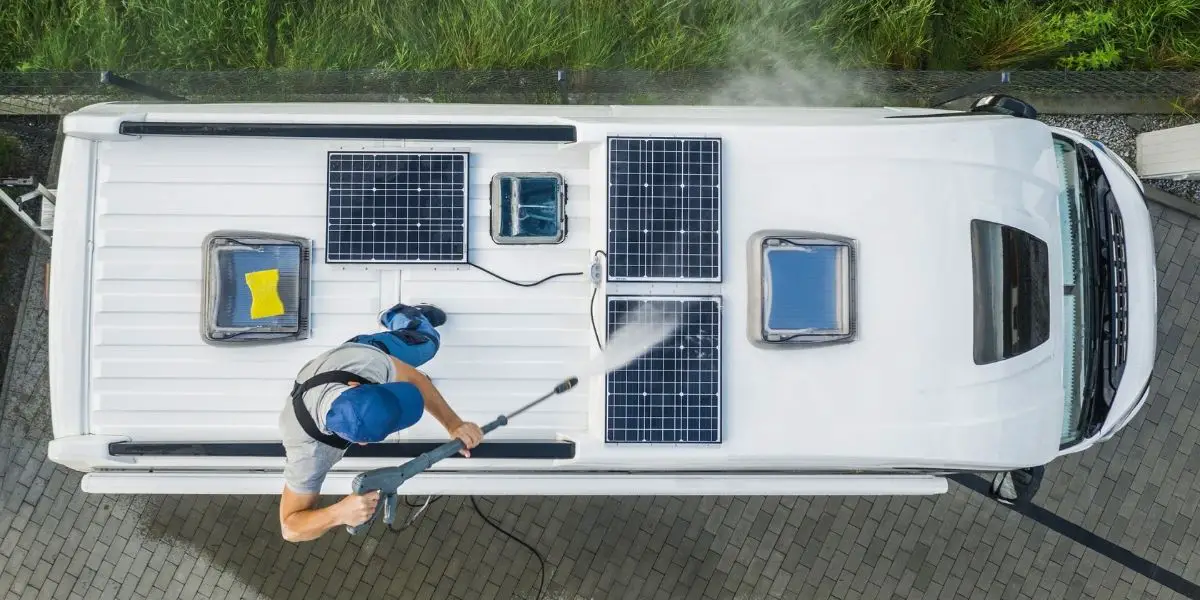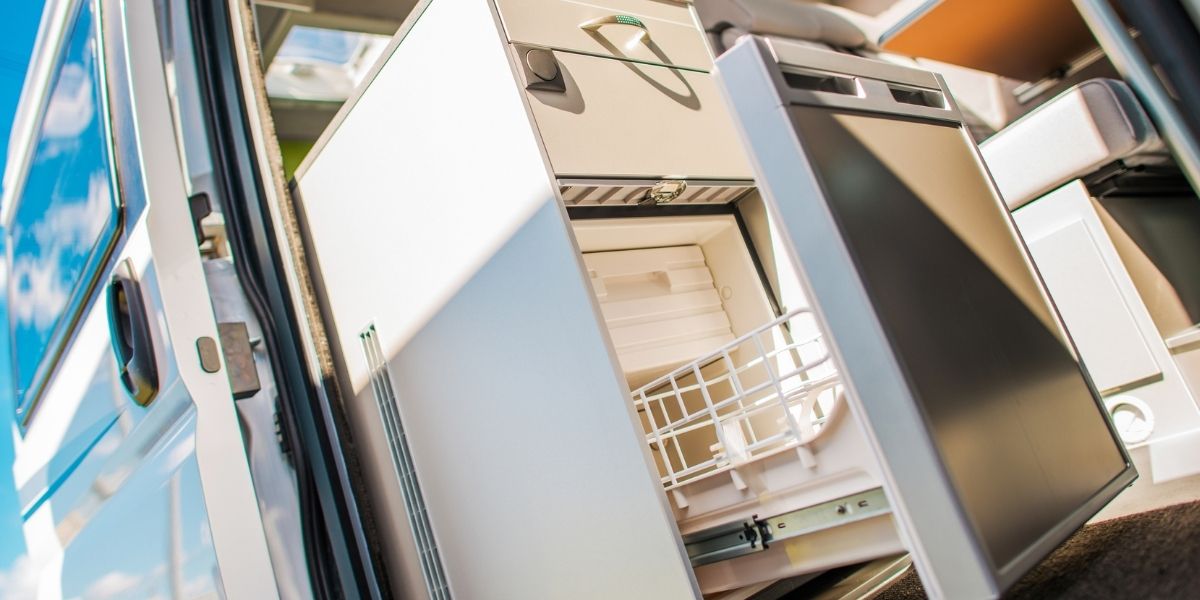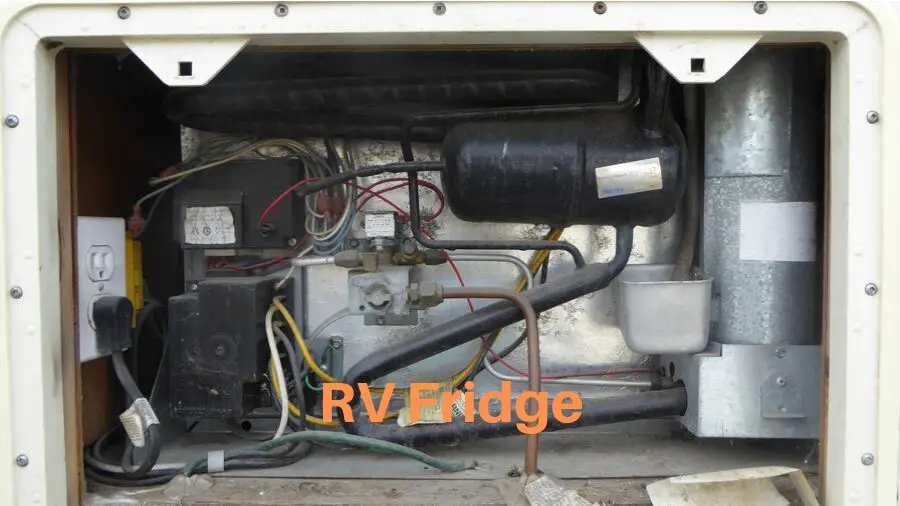Boondocking is the ideal way to get away from busy campsites, but not having continuous power poses several challenges namely, how to keep your fridge cold without power, while conserving propane for other purposes. The average RV fridge today uses 3 to 13 amps on DC power, so with a solar array of 100 to 300 watts it is possible to run your RV fridge a if you have a DC compressor fridge and two 100-watt lithium batteries.
However, if you want to run your RV fridge consecutively for days there are several things that need to be done to ensure power conservation in your battery bank and top up with solar power as much as possible when there is sunlight. After speaking with multiple people about what they do when they boondock to keep their fridges cold, this is what others have told me about using solar panels to power their fridges sometimes for weeks at a time.
- A Newer fridge is more efficient with power than an older fridge.
- A DC compressor fridge is even more efficient at using power to keep your food cold than an absorbent fridge.
- Use lithium iron batteries as you can get more out of them than lead acid batteries.
- At night turn your fridge down to 1 or 2 setting to conserve on power.
- Top up your Batteries as much as possible during sunlight hours.
- Turn your solar panels directly towards the sun to get maximum absorption.
- Keep your solar panels clean.
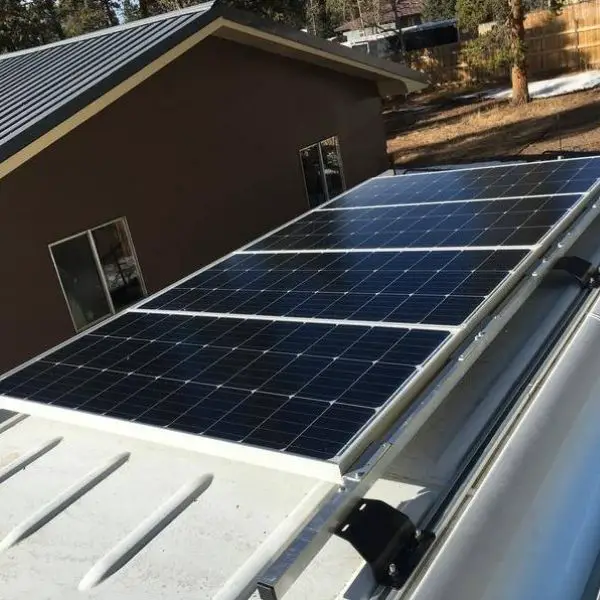
7 RV Fridges That Can Run On A 200 Watt Solar Panel
I looked at 7 fridges from Dometic and Norcold from the largest to the smallest. I decided to replace the smaller fridges with the midsized ones as they would draw more energy. To my surprize all the fridges could be run on 12 DC power with 200 watt solar panels. Even the largest fridge from Norcold, the 2118 PolarMax with a cubic size of 18.3 feet could be run on a single 100 watt solar panel using 3.4 amps/40.92 watts running on DC. So if you wanted to run your RV fridge on a 100 watt solar panel, it certainly can be achieved.
However, running an absorbent fridge on DC power is not cooling the fridge on it’s most efficient power source. Running this 18 cubic feet fridge on AC power through an inverter, you would need at least 800 watts of solar power. All the other absorbent fridges that are smaller obviously consumed less power, than this large fridge
Here’s a summary of all the RV fridges that I looked at and the cubic size of the fridges. As you can see, 6 of the fridges would run sufficiently on a 100 watt solar panel. Only one, the Dometic DMC4101 required 156 watts to run, but remember this one is a compressor fridge, so it would be running at an optimal cooling state.
| Model | Fridge Type | Size Cubic ft | AC Amps | AC Watts | DC Amps | DC Watts |
| 2118 PolarMax | Absorption | 18.3 | 6.61 | 793.2 | 3.41 | 40.92 |
| Polar NA10LX | Absorption | 10 | 4.18 | 501.6 | 2.6 | 31.2 |
| Polar NA7LX | Absorption | 7 | 4.18 | 501.6 | 0.93 | 11.16 |
| Polar N10DC | Compressor | 10 | 8.3 | 99.6 | ||
| Polar DE-0061 | Compressor | 7 | 0.4 | 48 | 3.2 | 38.4 |
| Dometic DMC4101 | Compressor | 10 | 13 | 156 | ||
| Dometic CRX140S | Compressor | 4.8 | 0.95 | 114 | 7.7 | 92.4 |
| Furrion Arctic 12 | Compressor | 8 | 11 | 1080 | ||
| Furrion Arctic 12 | Compressor | 10 | 11 | 1080 |
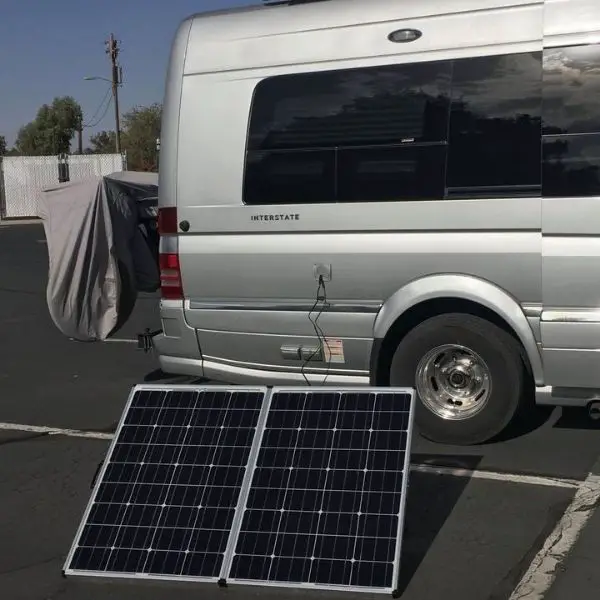
DC Compressor Fridge: The Ideal Off Grid Refrigerator
DC compressor fridges today, although appear they are not as efficient as the absorbent fridges in the chart above. DC compressor fridges are seven times more efficient that the traditional RV fridge in cooling. So, what this means is that on 12 DC power, the fridge can be as cold as an absorbent fridge on AC power. Although the power consumption in watts is higher, they produce the same chilling effect as the absorbent fridges running on AC or propane. It is possible to run a compressor fridge while boondocking and using one 100 watt solar panel.
DC compressor fridges take up less space so the ice box in as they don’t require the cooling rv vfins normally found in absorbent fridges, so there’s more storage room for food. If you want to read more about RV compressor fridges, you can go read this article here on them.
As a note the Furrion Arctic series of fridges are designed to run off grid and as an off grid setting for energy conservation features to help maintain your house battery power for longer.
How Many Solar Panels Do I Need To Run My Campers Fridge?
Most RV Fridges use about 11 to 300 watts of DC power to run, depending on the age of the refrigerator, so one to three 100 watt solar panels would be sufficient to run it during day time hours. Modern fridges today are far more efficient than ones that are even 10 years old. With the newer fridges it’s possible to run them on one 100 watt solar panel or less, however, this does not provide enough power to charge the battery to run the fridge through the night.

Can A 100 Watt Solar Panel Run A Refrigerator?
There’s a full range of compressor and absorbent fridges today from Dometic and Norcold that can run off a 100 watt solar panel or less. Even many of the older fridges in RVs can run off a 100 watt solar panel. The easiest way to find out if your campers’ fridge will run off a 100 watt solar panel is to look at the sicker on the side edge of your Fridge to see what the watts are required to run your fridge.
How To Compute How Many Solar Panels I Need For A RV Refrigerator
So, let’s say you have a Norcold Polar N10DC, which requires a rated DC input of 8.3 A and consumes 1.03 Ah/h (with an internal temperature of 39°F and operating in an ambient temperature of 90°F). With that in mind, this means that in 24 hours, this cooler will require 24.72 Ah of electricity to run in one day.
A typical 100 watt solar panel can produce around 30 Ah in a day (on an average sunny day), you’ll need just one (1) solar panel to charge your battery bank, in theory. I say this because you will have other appliances connected to your DC system (and your battery bank).
Let’s say you have a 160 Ah Lithium ion battery bank this means we’ll have 80 Ah useable power. And assuming you’ll ONLY be running this cooler on the battery and nothing else, just divide the battery’s useable power by the fridge’s consumption: 80 Ah battery / 1.03 Ah = 77.67 hours fridge running time. For a battery bank of this size, you’ll need around three (3) 100 watt solar panels to charge it enough to meet the minimum requirement.
Working the other way around, let’s now say you need 1200 Watt hours, which you’ll divide by around 8 hours of sunlight. Given this, you’ll need to get 150 watt solar panels to meet this requirement.
But as a general rule, they say it’s better to over rate than under rate your solar panel need by 20% – so this means you’ll need to get a 180 watt solar panel (or two (2) 100 watt solar panels). So as another example, if you want to run your 130 watt fridge, you’ll need a 1500 watt inverter and a 300w solar panel. If you have a 12 or 24 volt RV fridge wouldn’t need an inverter, but you’ll need a decent sized battery bank (at least 200 Ah), and an alternator.
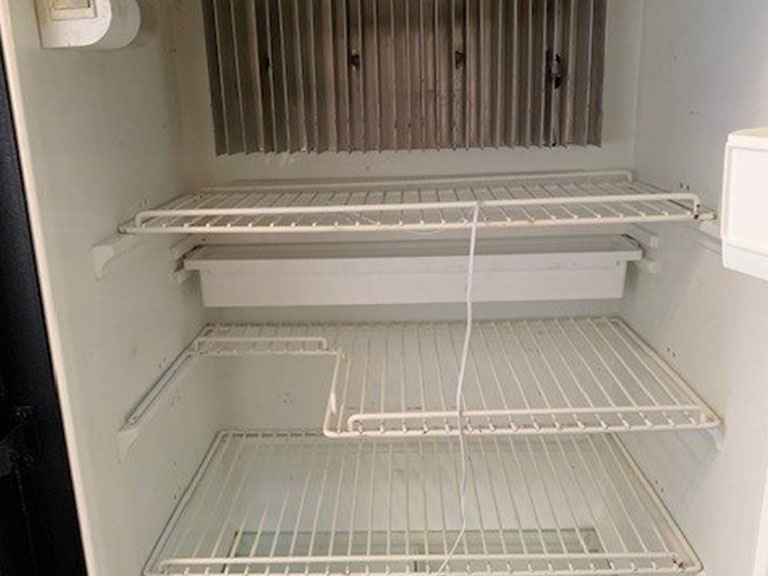
What Battery Size (& How Many Does) It Take To Run A RV Refrigerator?
The answer to this question will depend on your fridge (and your total electrical consumption in your RV). Which is why you need to know the fridge consumption per hour (check your user manual or on manufacturer’s website) and the size of battery in amp-hours that fits your budget.
Divide battery size in amp-hours by average consumption (multiplied by 24 hours) to get the approximate running time. Remember, it isn’t recommended to fully drain any type of RV battery (even if some can be fully drained) since it’ll not just affect its performance, but the life expectancy as well.
Some people suggest a safe amount would be to drain the battery to 50% for Lead Acid & AGM batteries, while Lithium Ion ones can be drained safely to around 80%. This means if you have a 100 Ah deep cycle battery, you’ll safely be able to use around 80 Ah power. Now, if you have a RV fridge that consumes ~1 Ah, you’ll be able to use the fridge for 80 hours (which is almost around three (3) days) before needing to recharge the battery.
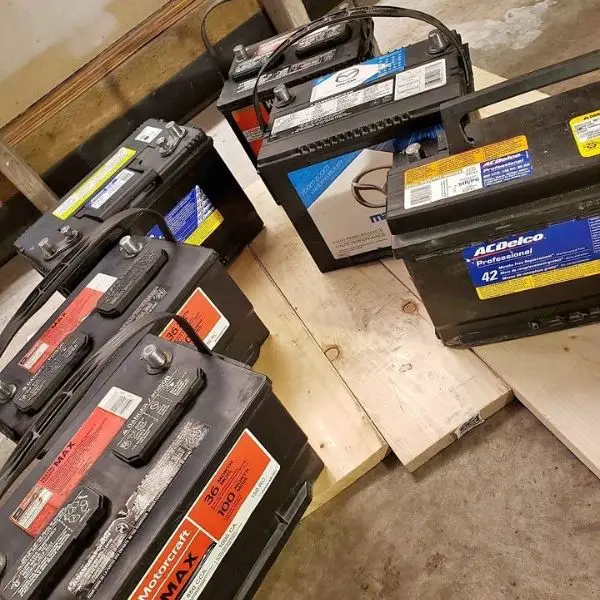
Choosing the type of battery to run your RV fridge (among other appliances in your RV), will heavily depend as well on you RV camping style. It’s understandable that a lot of people still use lead acid or AGM batteries, and they’re fine to use even with a proper solar panel setup, especially if you just use your RV occasionally (10 weekends or so a year). Lithium ion batteries are expensive, but will be something worth considering especially if you’ll be using the RV more long term since lithium ion batteries are smaller and more lightweight.
Once you know how many watts you can run your fridge on DC power.

